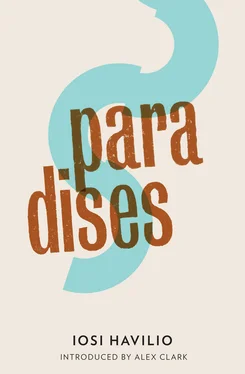Iosi Havilio - Paradises
Здесь есть возможность читать онлайн «Iosi Havilio - Paradises» весь текст электронной книги совершенно бесплатно (целиком полную версию без сокращений). В некоторых случаях можно слушать аудио, скачать через торрент в формате fb2 и присутствует краткое содержание. Год выпуска: 2013, Издательство: And Other Stories, Жанр: Современная проза, на английском языке. Описание произведения, (предисловие) а так же отзывы посетителей доступны на портале библиотеки ЛибКат.
- Название:Paradises
- Автор:
- Издательство:And Other Stories
- Жанр:
- Год:2013
- ISBN:нет данных
- Рейтинг книги:3 / 5. Голосов: 1
-
Избранное:Добавить в избранное
- Отзывы:
-
Ваша оценка:
- 60
- 1
- 2
- 3
- 4
- 5
Paradises: краткое содержание, описание и аннотация
Предлагаем к чтению аннотацию, описание, краткое содержание или предисловие (зависит от того, что написал сам автор книги «Paradises»). Если вы не нашли необходимую информацию о книге — напишите в комментариях, мы постараемся отыскать её.
is an almost perfect novel." — Albert Camus's
reimagined with a female lead in in twenty-first-century Buenos Aires.
Recently widowed, a young woman leaves the countryside for Buenos Aires with her four-year-old son where she seeks to build a new life for herself. She finds work in the zoo and moves into the human zoo of a squatted tower block at the invitation of one of its residents, to whom she acts as nurse, giving morphine injections.
Paradises — читать онлайн бесплатно полную книгу (весь текст) целиком
Ниже представлен текст книги, разбитый по страницам. Система сохранения места последней прочитанной страницы, позволяет с удобством читать онлайн бесплатно книгу «Paradises», без необходимости каждый раз заново искать на чём Вы остановились. Поставьте закладку, и сможете в любой момент перейти на страницу, на которой закончили чтение.
Интервал:
Закладка:
Back in el Buti, the issue is how to get rid of the iguana. I take advantage of the fact that Herbert, his mood much improved, is playing with Simón, throwing pieces of Styrofoam, and I climb onto the chair to grab the box with the packaged animal. Be right back, I say to the air, determined to put an end to the matter without hesitation and throw the creature out with the rubbish. As I descend the stairs, I’m struck by a vivid thought, a command that forces me to turn back. I discard the box down the lift shaft and with the animal enclosed in my fist I go up to find Herbert and Simón. Perhaps it’s because of what Iris told me this afternoon, the fruits of her lie, it must be something like that. I call them over. I try to proffer explanations I don’t have, I immediately feel I’ve said too much. I open my hand, exposing the body. Simón looks down at it, without conviction, Herbert draws his face close with a morbid fascination. I conclude: Animals are like plants and people, they live for the time they have to live, then they disappear. I don’t say die. And Simón, who finally peels his eyes away from the green iguana that is now far from green, increasingly grey, stares at me and takes all the time in the world to fabricate a smile, at first timid, hesitant, barely a stretch of the lips, which as the seconds pass broadens into an infectious little laugh.
We discuss what to do with the body. Herbert wants to light a small bonfire, Simón insists on keeping it, I impose my decision to bury it. We descend in a slow procession, they act as escorts, I’m in the middle with the deceased. On the pavement, we consider our options: trees, flower beds, the fig tree in a neighbouring lot. We take a vote and the paradise wins. Without being asked, Herbert assumes the role of gravedigger. He uses his hands to scrape a well the size of a grapefruit, more than enough. I take charge of depositing the iguana in the pit and all of us, after a brief pause, a minimal, silent homage, with no speech or farewell, cover it with earth. Simón takes care of flattening the grave with his feet but there is still a slight mound, barely perceptible, blending in with the protuberances of the tree roots, which leave nothing smooth.
The dream of Eloísa and her greedy cunt returns. Playing cards this time, aces and kings, clubs, diamonds and hearts. She rolls them up and slips them in and I have to guess which card will come out. It’s just a question of luck.
Thirty
Friday arrives. Eloísa tells me to meet her at one in the afternoon. On the dot, she writes in the last of seven messages she sends me the night before. She also says: All ready, I got gloves. I don’t reply, I concentrate on the drawing of the snake, the huge tome lying between my legs. The idea of the robbery is spinning round my head and even though it only ever sounds unreal to me, just another story, sometimes I become more practical and try to visualise it. I think of the consequences, the laws and the social aspects, about the benefits too, the money I could use for I don’t really know what. The most sensible thing would be to give up before it’s too late. When my eyes start to close and I no longer have a firm enough hand to carry on tracing the boa with its million scales, I grope for the mobile and two seconds before I regret it I text: Fine.
I’m punctual, as Eloísa asked me to be; at five minutes past I ring the bell and it’s clear she’s been waiting for me. The iron gate slides back with a sigh to let me through. Her head appears at the back of the garage above the car roofs. She waves without speaking, nor does she say anything when we are face to face, she gives me a quick kiss and a manly pat on the shoulder. I can see her properly now we are entering the kitchen. Her hair is wet, combed slickly back, just out of the shower. She’s dressed in a red vest top that clings to her body and dark blue jeans, also tight. She isn’t wearing a bra. If I didn’t know her I’d say she looked reliable and determined. It’s as if the role of thief in which she’s about to make her debut should be underpinned by a change of appearance, to give her courage and throw people off the scent. She asks if I want coffee, she doesn’t offer me alcohol as she usually does, I suppose staying sober is part of the plan. I accept half a cup and as I drink I think that, in this mini gang we have formed, she would be the boss and I the henchman.
First, before the action, a brief conference in the everyday dining room. We go through some rules: avoid making noise and dropping things, nothing to attract attention, speak quietly just in case, leave everything in its place, even the slightest little thing, keep the gloves on until the end. Surgical gloves that Eloísa hands to me seriously as if they were a secret weapon. We just need to allocate roles, to decide how to carry out the coup. The question is whether I accompany her or keep lookout. The second option sounds more prudent but if I stay alone on the ground floor and someone enters it will look suspicious. We’d best go together, Eloísa concludes, we can always invent something. Say I wanted to show you the jacuzzi, some bollocks like that.
At the foot of the stairs, giving me to understand that from now on the real adventure has begun, that setting foot on the first step is already part of the crime, Eloísa shows me a clenched fist. A code of the underworld I haven’t yet grasped. I respond as best I can, imitating her with much less enthusiasm. The curved, solid banister serves as a guide for my ascent, my latex skin gliding over the wood frictionlessly, as if it had just been waxed.
Upstairs, the walls are populated with family portraits, all the same size and identically framed. Axel’s parents by the sea, him, heavily bearded, her, pregnant, hair long and uncombed. Cheek to cheek, they are both biting a slice of pizza, two perfect sets of teeth marks. Next to it, Axel and his sister, in little sailor suits. Teenagers, with braces, and more up-to-date snaps, the four of them together with slightly forced smiles. There are also black-and-white portraits, grandparents, great-great-grandparents, children from the past, Axel’s ancestors. What are you doing? Eloísa calls me, sticking half her body out, two doors along.
The room is as immense as a room can be. Eloísa drops out of character and for an instant is the same as ever. She jumps and belly flops onto that limitless bed where four or five could easily sleep without bothering each other. What bastards, she says, looking at the ceiling. On the other side there’s a chest of drawers with a collection of perfumes and silver figurines: an army of naked dwarves with very pronounced penises. Have you seen the state of the bathroom? I lean in: the famous jacuzzi next to the window, a massage table, the toilet with bronze seat and lid, luxurious but cold. In a corner, an exercise bike, handlebars folded. Ready, says Eloísa, rubbing her hands together. Once more she becomes serious and stands up determinedly.
There it is, she says, gesturing to a sliding door that opens in the middle of the wall. We move into a dressing room with a mirror at the back. To the right, women’s clothes, dresses, skirts and coats, to the left, an endless row of men’s suits, more or less identical, many grey, some black or blue. Eloísa moves ahead and unhooks the mirror. Ta-dah, she says as she uncovers the safe. Guess where the key is. She points out two rows with fifty-odd shoes on either side. Party shoes, heels, boots, sandals, clogs, slippers. No, I don’t know. Another clue: It’s red and for women. I don’t answer. Eloísa takes a step forward, bends down, she’s about to unveil the mystery.
And suddenly: a door slamming, a creak and another slam. Hide the gloves, Eloísa tells me, tapping me with her finger so that I keep silent. She’s been knocked off course, she doesn’t understand, she interlaces her fingers and twitches them, asking me for an explanation that naturally I won’t be able to give. We allow thirty seconds to pass, immobile and expectant. Eloísa re-hangs the mirror on the wall and leaves the shoe in its place. Act as if nothing’s happened, she says, leaving the room. From the corner of the staircase we see that the door to Axel’s room is opening, he stays as quiet as us, disconcerted. Eloísa is quick: You scared us, dickhead, she says and raises a hand to her chest. Axel shrugs apologetically. What are you doing? he asks. She wanted to see, says Eloísa, nodding towards me. Oh.
Читать дальшеИнтервал:
Закладка:
Похожие книги на «Paradises»
Представляем Вашему вниманию похожие книги на «Paradises» списком для выбора. Мы отобрали схожую по названию и смыслу литературу в надежде предоставить читателям больше вариантов отыскать новые, интересные, ещё непрочитанные произведения.
Обсуждение, отзывы о книге «Paradises» и просто собственные мнения читателей. Оставьте ваши комментарии, напишите, что Вы думаете о произведении, его смысле или главных героях. Укажите что конкретно понравилось, а что нет, и почему Вы так считаете.











